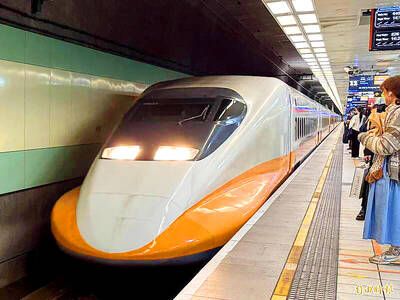Taiwan has started using advanced biotechnology to protect endangered whales and dolphins against poachers, supplementing existing DNA testing, agriculture officials said earlier this week.
A newly developed litmus test financed by the government will show within minutes whether meat samples seized from poachers are whale or dolphin meat, the officials said.
Poachers previously tried to avoid prosecution by cutting the heads off dolphins or whales that they caught.
Three years ago, the council began using DNA tests to identify the meat, but results took five days to arrive.
“Now it takes only 10 minutes to verify any samples,” said Kuan Li-hao (管立豪), director of the Forestry Bureau’s Conservation Division.
The litmus paper is designed to be activated by the unique structure of a protein in whales and dolphins, said Yang Wei-cheng, an associate professor of the National Chiayi University who heads the research team.
More than 30 officials from customs, the coast guard and other government bodies attended a training session in Taipei on Tuesday on the new detection method.
About 100 more officials were to have taken the training course by Thursday, Kuan said.
All species of whales and dolphins have been protected by Taiwan’s conservation law since 1989.
Violators face a prison term of up to five years and a fine of up to NT$1.5 million (US$50,000).
While poaching continues, the number of offenses was declining, the council said.

The inspection equipment and data transmission system for new robotic dogs that Taipei is planning to use for sidewalk patrols were developed by a Taiwanese company, the city’s New Construction Office said today, dismissing concerns that the China-made robots could pose a security risk. The city is bringing in smart robotic dogs to help with sidewalk inspections, Taipei Deputy Mayor Lee Ssu-chuan (李四川) said on Facebook. Equipped with a panoramic surveillance system, the robots would be able to automatically flag problems and easily navigate narrow sidewalks, making inspections faster and more accurate, Lee said. By collecting more accurate data, they would help Taipei

TAKING STOCK: The USMC is rebuilding a once-abandoned airfield in Palau to support large-scale ground operations as China’s missile range grows, Naval News reported The US Marine Corps (USMC) is considering new sites for stockpiling equipment in the West Pacific to harden military supply chains and enhance mobility across the Indo-Pacific region, US-based Naval News reported on Saturday. The proposed sites in Palau — one of Taiwan’s diplomatic allies — and Australia would enable a “rapid standup of stored equipment within a year” of the program’s approval, the report said, citing documents published by the USMC last month. In Palau, the service is rebuilding a formerly abandoned World War II-era airfield and establishing ancillary structures to support large-scale ground operations “as China’s missile range and magazine

A 72-year-old man in Kaohsiung was sentenced to 40 days in jail after he was found having sex with a 67-year-old woman under a slide in a public park on Sunday afternoon. At 3pm on Sunday, a mother surnamed Liang (梁) was with her child at a neighborhood park when they found the man, surnamed Tsai (蔡), and woman, surnamed Huang (黃), underneath the slide. Liang took her child away from the scene, took photographs of the two and called the police, who arrived and arrested the couple. During questioning, Tsai told police that he had met Huang that day and offered to

BETTER SERVICE QUALITY: From Nov. 10, tickets with reserved seats would only be valid for the date, train and route specified on the ticket, THSRC said Starting on Nov. 10, high-speed rail passengers with reserved seats would be required to exchange their tickets to board an earlier train. Passengers with reserved seats on a specific train are currently allowed to board earlier trains on the same day and sit in non-reserved cars, but as this is happening increasingly often, and affecting quality of travel and ticket sales, Taiwan High-Speed Rail Corp (THSRC) announced that it would be canceling the policy on Nov. 10. It is one of several new measures launched by THSRC chairman Shih Che (史哲) to improve the quality of service, it said. The company also said